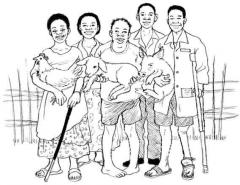Your progress
0%
complete
Livelihood is part of CBR because, according to the Joint Position Paper developed by ILO, UNESCO and WHO in 2004: “It is essential to ensure that both youth and adults with disabilities have access to training and work opportunities at community level”.
Children begin learning knowledge and skills in the family at an early age by watching and learning how to do things from parents and other family members. Like all children, children with disabilities should also be encouraged to learn, participate and make a contribution in the family. Likewise, disabled family members of working age should be assisted and encouraged to develop skills that will enable them to start or return to work.
CBR that addresses the skills development and livelihood needs of youth and adults with disabilities in a community will be more sustainable.
See how a young man in Uganda used his education and strong motivation to help lift his family and many others in his community out of poverty.


David was disabled by polio as a child. His father rejected him because of his disability, but his mother insisted he go to school. After completing primary school, David attended a boarding secondary school in Kampala, the capital of his country, Uganda. Then he went to a tutorial college where he earned a diploma in bookkeeping and secretarial work.
David was strongly motivated to work for the development of people with disabilities in his home rural area of Masaka and did not see working as an accounts clerk in Kampala as a way to achieve this aim. So he trained as a veterinary technician through a distance learning course at Makerere University, sponsored by a local non-governmental organization.
On qualifying, David became a self-employed veterinary technician in Masaka and began to mobilize people with disabilities. He cycled around the rural areas of his home district to identify families with people with disabilities. He focused on families, not simply on individuals, because involving the whole family enabled its members to see the individual with disabilities as an asset, not as a liability.
David began to breed good quality cows, goats, pigs, turkeys and chickens and to train people with disabilities and their families in better animal husbandry. He gave animals to these families on condition that they give him the first offspring, which could then be given to another family. David realized early on that to train people in better animal husbandry required a model farm and a training centre with accommodation, where people could come for training courses lasting several days. His model farm now has Friesian cows, cross-bred goats and pigs and good quality turkeys and chickens kept in well-constructed pens.
David formed the Kawule Disabled Persons and their Families Association. Ten years later, the association has over 500 members. Each member pays a small membership fee, which is the main source of income for the association.
David said: “I wanted to say ‘no’ to my own experience of limited opportunities, stereotyping and discrimination. I wanted to prove that real development with disabled people in rural areas in Uganda is possible.Traditionally, people with disabilities, if they are taught anything at all, are taught handicrafts, which have a very limited market in rural areas. It seemed to me that the only thing that made sense was farming and in particular livestock.”